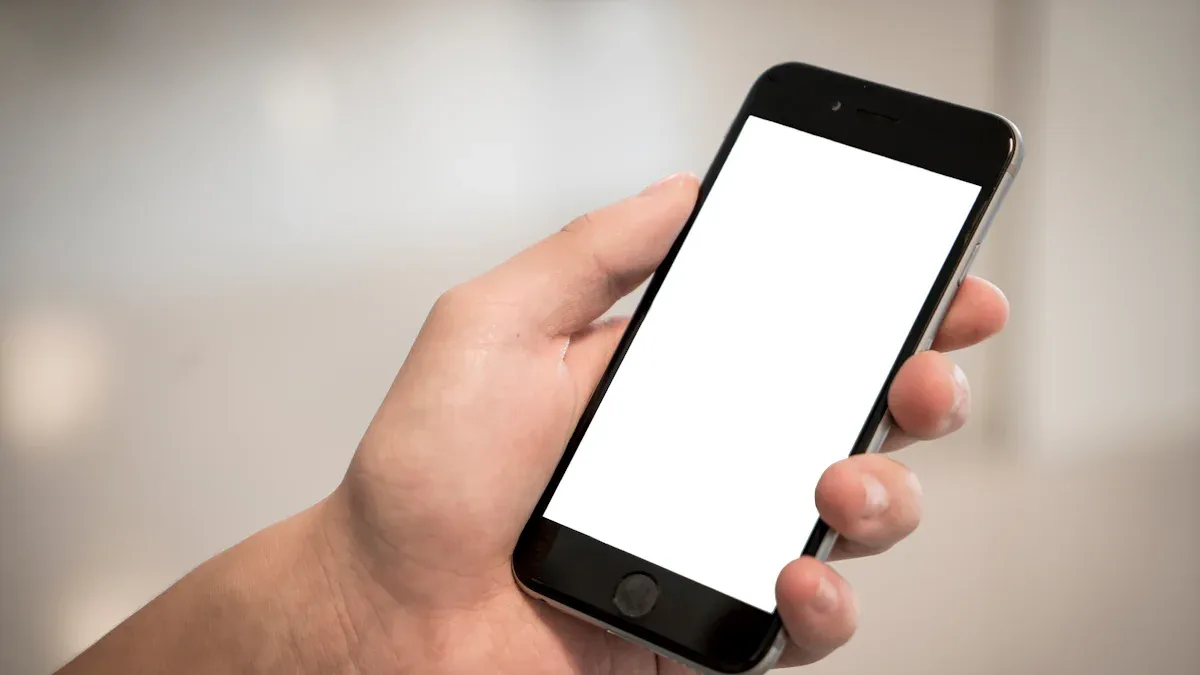
Imagine needing help in an emergency but not knowing the language. A language interpretation service phone can be your lifesaver. In the U.S., about 68 million people speak a language other than English at home. These phone services are very important. They give fast, expert help in over 230 languages. You can use them anytime you need. Whether it’s for healthcare, legal issues, or business, these services make talking easier. You don’t need to plan ahead. You get help right away and feel calm when it’s most needed.
📞 Tip: Keep your service provider’s number handy for emergencies.
Key Takeaways
-
Phone interpretation services help quickly in over 230 languages. This makes talking easier during emergencies.
-
Join a trusted service to get skilled interpreters anytime. This helps in healthcare, legal, or business talks.
-
Save the service's toll-free number on your phone. This way, you can use it fast in urgent times.
-
Picking the right language is very important for clear talks. Always check the needed language before calling.
-
Skilled interpreters make talks clear and satisfying. They ensure no important details are missed in serious talks.
What Is Over-the-Phone Interpretation?
Definition and purpose
Over-the-phone interpretation lets you talk to a professional interpreter through a phone call. It helps when you and someone else don’t speak the same language. This service is quick, trustworthy, and ready whenever you need it. It’s a smart way to break language barriers instantly.
The idea of phone interpreter services has existed for many years. For instance, Japan started its first phone interpreting service in 1986. By 1990, the UK and France had similar services. In the U.S., courts began using phone interpretation in 2002. It saved money and kept communication clear. Many administrators like these services because they are easy to use and affordable. One court worker even called it a “great deal for the government.”
Some people prefer face-to-face interpreters, but phone interpretation is more flexible. You can use it anytime and anywhere without setting up a meeting. Whether you’re at a hospital, in court, or at home, this service makes sure you can understand and be understood.
Common scenarios for using phone interpreter services
You might wonder when you’d need a phone interpreter. The truth is, it’s helpful in many situations. Here are some examples:
-
Healthcare: Hospitals use these services to talk with patients who don’t speak much English. If you need to explain symptoms or follow a doctor’s advice, a phone interpreter can help.
-
Legal settings: Courts and lawyers use phone interpreters to make sure things are fair. They’re especially useful during urgent meetings or hearings.
-
Government services: Agencies use phone interpreters to help people from different backgrounds. This ensures everyone gets important information.
-
Insurance: Companies use interpreters to explain claims and policies to clients who speak other languages.
-
Education: Schools use these services to talk with parents and students who speak different languages.
-
Emergency services: Police and first responders use phone interpreters during emergencies. Clear communication can save lives.
These examples show how phone interpreter services can really help. Whether it’s a normal situation or an emergency, this service makes sure language differences don’t hold you back.
Step-by-Step Guide to Using Phone Interpreter Services
Signing up with a service provider
To use phone interpretation, first sign up with a trusted provider. This gives you access to skilled interpreters anytime you need them. Signing up is easy and quick. Most providers let you register online by filling in your name, contact details, and payment method. Some even let you pick languages you’ll need often.
Why is signing up important? Studies show interpreter services improve outcomes, especially in healthcare. For example, patients with limited English who used these services got better care. They visited doctors more often and filled prescriptions regularly. By signing up, you’re preparing for smoother communication in important moments.
📝 Pro Tip: Choose a provider that offers the languages you need most. This saves time during emergencies.
Calling the service’s toll-free number
After signing up, call the service’s toll-free number for help. Save this number on your phone or write it down somewhere safe. When you call, an operator will assist you. They’ll ask which language you need or help figure it out. If you need to add someone else, like a doctor, they can do that too.
Here’s what happens when you call:
|
Step |
What Happens |
|---|---|
|
1 |
Dial the toll-free number from your provider. |
|
2 |
The operator asks for the language you need or helps identify it. |
|
3 |
They ask if you want to add another person to the call. |
|
4 |
You’re connected to a professional interpreter. |
|
5 |
Billing starts when the interpreter joins the call. |
The toll-free number lets you get help fast, wherever you are. It’s a simple way to overcome language barriers.
📞 Reminder: Save the toll-free number as “Language Help” for quick access.
Using an access code or answering questions
When you call, you might need to enter an access code or answer questions. This step confirms your account and connects you to the right interpreter. You’ll get the access code when you sign up, so keep it handy. If there’s no code, the operator may ask for your name or account info.
Some services ask questions to make things easier. They might confirm the language you need or ask about your call’s purpose. This ensures you’re matched with an interpreter who knows the topic. For example, a medical call connects you to someone familiar with health terms.
🛠️ Quick Tip: Can’t find your access code? Check your welcome email or contact support for help.
By following these steps, you’ll be ready to use phone interpreter services easily. Whether it’s a regular call or an emergency, this process ensures you get help quickly.
Picking the language you need
After calling the service, you choose the language you need help with. This step is very important for clear communication. Picking the right language connects you to an interpreter who understands your needs. If you’re unsure, the operator can ask questions to figure it out.
Why does this matter? Studies show choosing the correct language improves accuracy. For example:
-
A method called DSIR showed better results with proper selection.
-
It found a strong link (0.82) between good choices and accuracy.
-
DSIR beat random methods by 2-2.5% in tests, proving careful selection works.
Choosing the right language helps you get accurate communication. Whether it’s about health or legal issues, this step makes conversations easier.
🗣️ Tip: If helping someone else, ask them to say a few words. This helps the operator identify their language faster.
Talking with a skilled interpreter
Once the language is picked, you’ll talk to a skilled interpreter. They join the call to help both sides understand each other. The interpreter listens, translates, and makes sure everyone communicates clearly.
Why are professional interpreters important? Research shows they improve outcomes:
|
Study |
Results |
|---|---|
|
Parsons and Day 1992 |
Fewer medical interventions happened with professional interpreters. |
|
Kuo and Fagan 1999 |
Patients felt more satisfied with professional interpreters. |
|
Farooq, Fear, and Oyebode 1997 |
Mental health checks were as good as those done by language-matched doctors. |
|
Chan and Woodruff 1999 |
Cancer patients understood their diagnosis better with interpreters. |
|
Jacobs et al. 2001 |
Preventive care gaps decreased with professional interpreters. |
These studies show interpreters improve healthcare, legal, and other services. They bring skill, cultural knowledge, and fairness to conversations. This ensures nothing is misunderstood.
📞 Reminder: Be patient during the call. The interpreter might ask questions to make sure everything is clear.
By following these steps, you’ll see how helpful phone interpreting can be. Whether it’s a regular call or an emergency, skilled interpreters make communication smooth and effective.
Benefits of On-Demand Language Assistance

Quick help from interpreters
When you need help fast, on-demand language services connect you to interpreters right away. Whether you're at a hospital, in court, or facing an urgent problem, this service helps you talk clearly without waiting. Imagine being sick and unable to explain your symptoms. Having an interpreter instantly can make things much easier.
Studies show hospitals using special phones for language help had fewer patients returning within 30 days. This proves quick language support is very important during emergencies. With phone interpretation, you don’t need to wait for a meeting or depend on someone who might not understand you well. You get accurate help exactly when you need it.
🛠️ Tip: Save your provider’s number for emergencies. It’s your key to fast language help.
Always available for urgent situations
Emergencies don’t follow schedules, and neither do language problems. That’s why on-demand language services are open 24/7. No matter the time or day, you can get real-time help whenever you need it.
Here’s why this is important:
-
Over 47 million people in the U.S. speak a language other than English at home.
-
Many people with limited English face challenges getting healthcare.
-
These challenges lead to fewer checkups and less satisfaction with services.
With 24/7 access, you can solve these problems and talk clearly anytime. Whether it’s a late-night emergency or a last-minute business call, skilled interpreters are always ready to help.
Skilled interpreters for clear communication
Professional interpreters do more than just translate words. They make sure translations are correct and include cultural details and technical terms. This skill is very important for healthcare, legal, and business talks.
Here’s how different methods compare:
|
Interpretation Method |
Strengths |
Weaknesses |
|---|---|---|
|
Professional Interpreters |
High-quality care and accuracy |
May not always be better than other methods |
|
Family Interpreters |
Focused on patient needs |
Lack of proper training |
|
Bilingual Staff Interpreters |
Know clinic-specific details |
May lack strong language skills |
|
Remote Interpreters |
Affordable and accurate |
Harder to connect emotionally without body cues |
|
Videoconference Interpreters |
Can use visual cues |
Less cultural understanding compared to in-person interpreters |
Professional interpreters stand out because they mix accuracy with cultural understanding. They make sure nothing is misunderstood, giving you confidence in every conversation.
📞 Reminder: For serious situations, ask for a professional interpreter. They’re the best choice for clear communication.
Cost-effectiveness compared to in-person services
Did you know phone interpretation costs less than in-person help? It does! With over-the-phone services, you avoid travel fees and hourly rates. You only pay for the minutes you use, making it great for quick or sudden needs.
Imagine needing a medical interpreter right away. Waiting for someone to arrive in person could waste time. Phone interpretation fixes this fast and costs much less. Hospitals like it because it’s affordable and works well. You get expert help without spending too much.
Another perk is on-demand access. You don’t need to schedule days ahead or worry about cancellations. This saves both time and money, especially during emergencies or urgent calls.
Here’s a simple comparison:
|
Service Type |
Cost |
Convenience |
|---|---|---|
|
In-person interpreter |
Travel fees, hourly rates |
Needs advance scheduling |
|
Phone interpreter |
Pay-per-minute pricing |
Ready anytime |
Phone interpretation is ideal for fast, clear communication at a lower cost. Whether it’s for health or legal needs, it’s affordable and dependable.
💡 Tip: On a budget? Choose phone interpretation for expert language help without overspending.
How to Choose the Right Phone Interpreter Services
Checking language options and coverage
When picking a phone interpreter service, start by checking its language options. Not all services offer the same language choices, which can affect your needs. Some focus on common languages like Spanish or Mandarin. Others include less common ones like Swahili or Tagalog. If you work with diverse groups, pick a service with wide coverage.
Why is this important? Many places struggle to provide enough language help. For example:
-
A 2006 study showed $4.7 million was spent on language services for 22,353 patients in a state Medicaid program.
-
In rural Minnesota, 25% of small hospitals had trouble paying for these services.
-
A national report found over 30% of hospitals didn’t offer any language help.
These gaps show why choosing the right service matters. Quick access to interpreters avoids delays and confusion. Whether it’s a medical emergency or legal issue, having proper language support ensures smooth communication.
🗣️ Tip: Ask the provider for a list of supported languages before signing up. This avoids surprises later.
Reviewing speed and response time
In emergencies, every second matters. That’s why you should check how fast a service connects you to an interpreter. Quick response times are crucial for urgent situations like medical or legal issues. A good service should connect you in under a minute.
Imagine being in court and needing to explain something to the judge. A slow connection could cause delays and stress. A fast service lets you focus on the conversation without worrying about waiting.
To test speed, try the service during busy hours. Some companies promise fast times but struggle when demand is high. You can also read reviews or ask others about their experiences.
⏱️ Note: Pick a provider that guarantees fast response times, even during busy periods. This can save you from unnecessary stress.
Verifying interpreter skills and certifications
Not all interpreters have the same skills. Make sure the service hires qualified interpreters with proper certifications. This is especially important for legal, medical, or technical conversations where accuracy is key.
For legal cases, interpreters should have certifications like the Court Interpreter Certification from the National Center for State Courts (NCSC). In healthcare, look for interpreters certified by the Certification Commission for Healthcare Interpreters (CCHI) or the National Board of Certification for Medical Interpreters (NBCMI). These certifications show they can handle complex terms and sensitive topics.
Why does this matter? Skilled interpreters do more than translate—they also understand cultural details and ensure nothing is misunderstood. This expertise is vital for clear communication, especially in high-pressure situations.
📜 Pro Tip: Ask the provider about their hiring process. Do they require certifications? Do they train interpreters regularly? These details help you pick a reliable service.
Keeping Your Calls Private and Confidential
When using phone interpretation services, keeping your information private is very important. You should feel safe sharing personal details about health, legal issues, or other concerns. Providers know this and work hard to protect your conversations.
Why Privacy Is Important
Think about talking about a health problem or legal issue on the phone. You wouldn’t want anyone else to hear it. Privacy helps you feel safe and talk openly without fear. For some people, finding a quiet place for these calls can be hard, especially in shared homes. Providers understand this and make sure your calls are secure.
🛡️ Tip: Try to find a quiet spot before calling. This helps keep your conversation private and focused.
How Providers Keep Your Calls Safe
Phone interpretation services use many tools to protect your privacy. These steps make sure your personal details and conversations stay safe:
-
Secure Networks: Providers use protected networks and updated software to block hackers.
-
Authentication: Strong passwords and extra security steps stop unauthorized access.
-
Consent: Before starting, providers may ask for your permission. This ensures you know how your information is handled.
These actions show that providers care about your safety. They use both technology and trust to protect your calls.
Handling Privacy Problems
Even with protections, privacy can still be tricky. For example, doctors working from home may find it hard to keep calls private. Patients in crowded homes might also struggle to find quiet spaces. Providers help by giving advice and support.
Here’s how you can make your calls safer:
-
Pick a Quiet Spot: Choose a place where no one will interrupt you.
-
Use Headphones: This keeps others from hearing the interpreter’s voice.
-
Update Your Device: Make sure your phone or computer has the latest updates.
🔒 Reminder: If privacy worries you, tell the operator. They can help make your call more secure.
By following these tips and trusting the provider’s safety steps, you can use phone interpretation services with confidence. Your privacy is important, and these services are built to protect it.
Using phone interpretation services is easy and helpful. Here’s a quick summary:
-
Register with a provider to get skilled interpreters.
-
Keep the toll-free number handy for emergencies.
-
Use your access code or answer simple questions.
-
Pick the language you need and talk to an interpreter.
These steps help you get quick support for healthcare, legal issues, or emergencies.
The advantages are clear:
-
Doctors found these services simple and effective.
-
Communication got much better, especially in urgent situations.
-
Many people said it made them more likely to ask for language help.
Why wait? Try phone interpretation now. It’s fast, dependable, and ready whenever you need it.
FAQ
How can I pick the best phone interpretation service?
Choose a service that supports the languages you need most. Read reviews to learn about speed and interpreter skills. Ask if they have certifications and strong privacy rules. A good service will meet your needs and keep your calls safe.
🛠️ Tip: Try calling during busy times to check how fast they respond.
Can I use phone interpretation in emergencies?
Yes, phone interpretation is great for emergencies. Most services are open 24/7, so help is always available. Whether it’s a health problem or legal issue, interpreters can assist you right away.
📞 Reminder: Save the toll-free number on your phone for quick help when needed.
Do phone interpreters know specific industries?
Yes! Many interpreters are trained in fields like healthcare, law, or business. They understand special terms and cultural details, making communication clear and accurate.
📜 Pro Tip: Ask your provider if their interpreters are certified in your field.
What does phone interpretation cost?
Costs depend on the provider, but most charge by the minute. This makes it cheaper for short calls. You avoid travel costs and hourly fees, saving money compared to in-person interpreters.
💡 Tip: Compare prices from different providers to find the best option for you.
Is my information secure during phone interpretation?
Yes, trusted services protect your privacy. They use secure systems and encryption to keep your data safe. Interpreters follow strict rules to ensure your conversations stay private.
🔒 Reminder: Pick a provider with clear privacy policies to keep your information secure.








